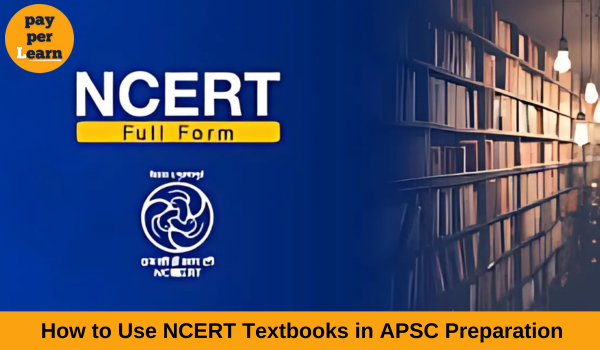
The Assam Public Service Commission (APSC) exam is a highly competitive test that demands a strong grasp of foundational concepts across a wide range of subjects. NCERT textbooks, known for their simplicity and comprehensive coverage, are a goldmine for aspirants looking to build these foundations. Here’s a detailed guide on how to effectively use NCERT textbooks for APSC preparation.
1. Understand the APSC Exam Pattern and Syllabus
Before diving into NCERTs, familiarize yourself with the APSC exam structure:
- Prelims: General Studies (GS) Paper I and an optional subject (if applicable).
- Mains: Essays, GS papers, optional subjects, and a language paper.
- Interview: Personality test.
Refer to the APSC syllabus and match its topics with relevant NCERT chapters. This ensures that your efforts align with the exam’s requirements.
2. Select Relevant NCERT Textbooks
NCERTs from Classes 6 to 12 are your primary resources. Here’s a subject-wise breakdown:
History
- Themes in Indian History (Parts I, II, III) – Classes 11 & 12
- Our Past series – Classes 6 to 10
Geography
- India: Physical Environment – Class 11
- Fundamentals of Physical Geography – Class 11
- Contemporary India – Classes 9 & 10
- India: People and Economy – Class 12
Polity
- Social and Political Life series – Classes 6 to 10
- Indian Constitution at Work – Class 11
- Political Science – Class 12
Economy
- Understanding Economic Development – Classes 9 & 10
- Introductory Microeconomics and Introductory Macroeconomics – Class 12
Science (for prelims and basic understanding)
- Science – Classes 6 to 10
3. Begin with the Basics
Start with Class 6 textbooks and progress systematically to Class 12. Focus on understanding concepts rather than rote learning. Highlight key points, take notes, and summarize chapters in your own words for better retention.
4. Focus on Important Topics
Some NCERT topics are more relevant for APSC than others. Prioritize:
- History: Ancient, Medieval, and Modern Indian History.
- Geography: Indian geography, climate, vegetation, and resources.
- Polity: Constitution, governance, and political systems.
- Economy: Indian economic development and key policies.
- Science: Environmental science and basic scientific concepts.
5. Integrate NCERTs with Advanced Resources
While NCERTs provide a solid base, supplement them with advanced books like Laxmikanth for Polity, Spectrum for Modern History, and G.C. Leong for Geography. Use current affairs sources like newspapers and government reports to stay updated.
6. Make Use of Visual Aids
NCERTs are rich in maps, charts, and diagrams. Use these to:
- Memorize geographical locations and physical features.
- Understand historical timelines and events.
- Grasp economic and political concepts visually.
7. Revise Regularly
Revisiting NCERTs multiple times ensures better retention. Create a revision schedule that includes daily, weekly, and monthly reviews. Use flashcards or digital tools to test your memory.
8. Solve Questions
NCERT textbooks often include chapter-end questions. Solve these to:
- Test your understanding.
- Practice answering in a structured format.
- Identify weak areas for further study.
9. Leverage NCERT PDFs
Download NCERT PDFs from the official website for easy access. This allows you to study on the go and revisit important sections anytime.
10. Incorporate NCERTs in Answer Writing
Use NCERTs as a reference for APSC Mains answer writing. Their language is simple yet precise, helping you craft well-structured answers. Include NCERT diagrams, examples, and case studies wherever applicable.
Conclusion
NCERT textbooks are indispensable for APSC preparation. They build a robust conceptual foundation, simplify complex topics, and cover a significant portion of the syllabus. By integrating NCERTs with advanced resources and consistent revision, you can enhance your preparation and increase your chances of success in the APSC exam.

